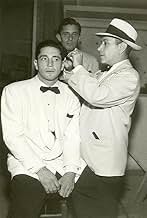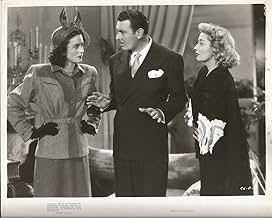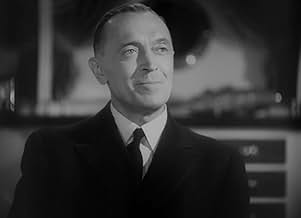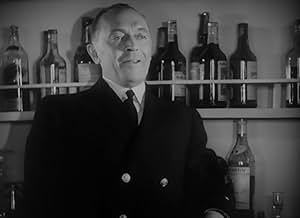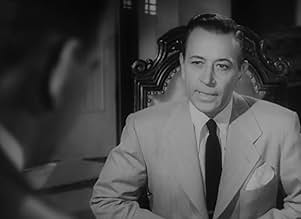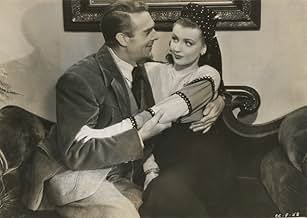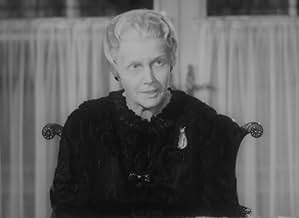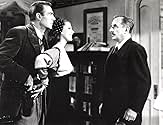To save her fortune from a designing nephew, Matilda Reed must locate her three long-lost adopted sons in time for a Christmas Eve reunion.To save her fortune from a designing nephew, Matilda Reed must locate her three long-lost adopted sons in time for a Christmas Eve reunion.To save her fortune from a designing nephew, Matilda Reed must locate her three long-lost adopted sons in time for a Christmas Eve reunion.
Douglass Dumbrille
- Dr. Bunyan
- (as Douglas Dumbrille)
5.7960
1
2
3
4
5
6
7
8
9
10
Featured reviews
strange film
Ann Harding plays an old spinster whose fortune is about to be taken over by her nephew (Reginald Denny) in "Christmas Eve," a 1947 film also starring George Raft, George Brent, Randolph Scott, and Joan Blondell.
Harding is Matilda Reed, a very wealthy old woman living in a New York mansion. Her nephew is about to have her committed and take over her fortune, but before the Judge can take action, Matilda begs him to stop by on Christmas Eve to meet her three sons, assuring him that they will stand by her.
These were three children she adopted as babies. Even though she has no idea where any of them are, she is certain they will be there as soon as she makes the fact that she needs help public.
The boys took off when they reached adulthood to make their own way and not take advantage of her.
We then see where they are now and what they're doing, which in a way is like three separate movies, particularly the Raft section, which is way out there. The first son is Michael (Brent), who is bouncing bad checks but engaged to a very wealthy woman. However, Blondell is in love with him and manages by her very presence to drive the fiancé away.
The next brother is Mario (Raft) living in Argentina, on the lam from a bad deal in Washington, D. C. He can't return to the states. His girlfriend has $10 million given to her to hold by her escaped Nazi boyfriend, and Mario finds himself in the middle of the situation trying to get his money back.
The third brother is Johnny (Scott), a rodeo rider drafted by a woman (Delores Moran, who wound up marrying the producer of this film) who needs a husband while she undertakes an investigation of a baby adoption racket.
An episodic film in the extreme which doesn't hold together despite a charming cast and some fun dialogue. It could have been a much sweeter and funnier film, but the script was weak.
"Christmas Eve" is far from horrible, has some good parts, but in the end is disappointing.
Harding is Matilda Reed, a very wealthy old woman living in a New York mansion. Her nephew is about to have her committed and take over her fortune, but before the Judge can take action, Matilda begs him to stop by on Christmas Eve to meet her three sons, assuring him that they will stand by her.
These were three children she adopted as babies. Even though she has no idea where any of them are, she is certain they will be there as soon as she makes the fact that she needs help public.
The boys took off when they reached adulthood to make their own way and not take advantage of her.
We then see where they are now and what they're doing, which in a way is like three separate movies, particularly the Raft section, which is way out there. The first son is Michael (Brent), who is bouncing bad checks but engaged to a very wealthy woman. However, Blondell is in love with him and manages by her very presence to drive the fiancé away.
The next brother is Mario (Raft) living in Argentina, on the lam from a bad deal in Washington, D. C. He can't return to the states. His girlfriend has $10 million given to her to hold by her escaped Nazi boyfriend, and Mario finds himself in the middle of the situation trying to get his money back.
The third brother is Johnny (Scott), a rodeo rider drafted by a woman (Delores Moran, who wound up marrying the producer of this film) who needs a husband while she undertakes an investigation of a baby adoption racket.
An episodic film in the extreme which doesn't hold together despite a charming cast and some fun dialogue. It could have been a much sweeter and funnier film, but the script was weak.
"Christmas Eve" is far from horrible, has some good parts, but in the end is disappointing.
A bit rickety now, but this three-part story of family ties still works...and George Brent's timing was never better
What's a mother to do? If she's the seriously rich, eccentric but still shrewd Mathilda Reed, now in her late seventies or early eighties and living alone with servants in a huge mid-town Manhattan mansion, and her untrustworthy nephew attempts to gain control of her fortune by having her declared incompetent, the answer is simple. She'll call upon her three sons. The trouble is, she hasn't heard from the grown men in years. The three came to her as wards. She adopted them and raised them. But when they were grown, each decided to leave and make his own way. They didn't want to be a burden or to live off their mother's fortune. Mathilda Reed (Ann Harding) may be a wonderful old woman, but her sons are something else.
There's Michael (George Brent), a high-living ne'er-do-well who finances his expensive tastes by kiting checks and who hopes to marry a rich woman. His girlfriend, Ann (Joan Blondell), is starting to get impatient.
There's Jonathan (Randolph Scott), who went west and now is a broken down but charming rodeo rider who sometimes has to pawn his saddle.
And there's Mario (George Raft), a fugitive from the law who went to South America and prospered as a shady nightclub owner. He can't return to the States without the FBI picking him up.
Mathilda Reed is a fighter. She goes public with a press conference, hoping her sons, wherever they are, will hear about her need for them. She hires a private detective to try and locate them. They have to return by Christmas Eve to block Phillip's plans.
Will the three men make it? Will they even try? Well, of course they will. So we spend most of our time in three short stories. We watch how Michael, amusing and unreliable, gets himself under Phillip's thumb with those bad checks and then starts to get himself out. We watch how Jonathan, back in New York, finds himself involved in a phony adoption scam and winds up with three baby girls and a great-looking girlfriend. We also hear a lot of Hollywood home-on-the-range dialogue...all those "heifers." We see Mario take on a Nazi fugitive, with fistfights and gunfights, before he leaves for New York with the FBI right behind him. And on Christmas Eve, with snow drifting down, with the mansion alight, with the tree gorgeously decorated and the Christmas punch made, Mathilda Reed, her nephew and the judge sit waiting. Sure enough, first Michael and Ann arrive. Then Jonathan and his three babies. And last comes Mario, with an FBI man right behind. We learn everything is going to turn out all right, even for Mario. The "crime" he left the States over was really committed by another. Phillip's scheme is dealt with and so is Phillip. Most importantly, we learn that the idea of family, played up with a little sentimentality and a sometimes serious but often amusing screenplay, can get the job done.
The movie is a little corny at times, especially with Ann Harding, younger than each of the actors playing her sons, doing the trembling and wise old lady bit. Her makeup would convince only the oldest residents of an assisted living center. Raft, Scott and Brent each do fine jobs. Raft, of course, is Raft, and his story is the most serious. Scott does a charming turn as the rodeo cowboy who winds up with an instant family. And George Brent, who was even better as a skilled farceur and light comedian than he was as an all-purpose leading man (watch him in 1947's Out of the Blue), is a joy to watch. All three were at turning points in their careers. This was Scott's last non-Western movie. Brent was fading fast as a star. Raft was starting to make a series of poor movies. Still, for me the movie works emotionally as the story of how three very different men drop whatever they're doing, for some at great risk, to return to help the woman who raised them and gave them the values that they have. When the three start to greet each other with pleasure in their mother's mansion on Christmas Eve, maybe it's just good acting but they look like they mean it.
There's Michael (George Brent), a high-living ne'er-do-well who finances his expensive tastes by kiting checks and who hopes to marry a rich woman. His girlfriend, Ann (Joan Blondell), is starting to get impatient.
There's Jonathan (Randolph Scott), who went west and now is a broken down but charming rodeo rider who sometimes has to pawn his saddle.
And there's Mario (George Raft), a fugitive from the law who went to South America and prospered as a shady nightclub owner. He can't return to the States without the FBI picking him up.
Mathilda Reed is a fighter. She goes public with a press conference, hoping her sons, wherever they are, will hear about her need for them. She hires a private detective to try and locate them. They have to return by Christmas Eve to block Phillip's plans.
Will the three men make it? Will they even try? Well, of course they will. So we spend most of our time in three short stories. We watch how Michael, amusing and unreliable, gets himself under Phillip's thumb with those bad checks and then starts to get himself out. We watch how Jonathan, back in New York, finds himself involved in a phony adoption scam and winds up with three baby girls and a great-looking girlfriend. We also hear a lot of Hollywood home-on-the-range dialogue...all those "heifers." We see Mario take on a Nazi fugitive, with fistfights and gunfights, before he leaves for New York with the FBI right behind him. And on Christmas Eve, with snow drifting down, with the mansion alight, with the tree gorgeously decorated and the Christmas punch made, Mathilda Reed, her nephew and the judge sit waiting. Sure enough, first Michael and Ann arrive. Then Jonathan and his three babies. And last comes Mario, with an FBI man right behind. We learn everything is going to turn out all right, even for Mario. The "crime" he left the States over was really committed by another. Phillip's scheme is dealt with and so is Phillip. Most importantly, we learn that the idea of family, played up with a little sentimentality and a sometimes serious but often amusing screenplay, can get the job done.
The movie is a little corny at times, especially with Ann Harding, younger than each of the actors playing her sons, doing the trembling and wise old lady bit. Her makeup would convince only the oldest residents of an assisted living center. Raft, Scott and Brent each do fine jobs. Raft, of course, is Raft, and his story is the most serious. Scott does a charming turn as the rodeo cowboy who winds up with an instant family. And George Brent, who was even better as a skilled farceur and light comedian than he was as an all-purpose leading man (watch him in 1947's Out of the Blue), is a joy to watch. All three were at turning points in their careers. This was Scott's last non-Western movie. Brent was fading fast as a star. Raft was starting to make a series of poor movies. Still, for me the movie works emotionally as the story of how three very different men drop whatever they're doing, for some at great risk, to return to help the woman who raised them and gave them the values that they have. When the three start to greet each other with pleasure in their mother's mansion on Christmas Eve, maybe it's just good acting but they look like they mean it.
Christmas EVE (Edwin L. Marin, 1947) **1/2
The perennial title in itself but especially the splendid cast rounded up for this Christmas movie should have earned it durability but, instead, its genuine oddity has ensured its obscurity; in fact, it was later retitled as SINNERS' HOLIDAY for theatrical reissue purposes (despite there having already been a non-festive 1930 film featuring James Cagney and Joan Blondell by that name!) and, much later, another unrelated (and made-for-TV) one called Christmas EVE in 1986 that was Loretta Young's much-heralded return in front of the cameras!!
There are three male leads in the film – George Brent, George Raft and Randolph Scott – playing the three adopted sons of eccentric millionairess Ann Harding (a weird casting choice if ever there was one, seeing how she is younger in real life than her on screen off-springs and, consequently, sports heavy make-up to appear older!) who is on the point of being declared insane by duplicitous relative/guardian Reginald Denny (who while outwardly concerned about Harding's reckless philanthropic spending is actually interested in appeasing his own creditors). Harding (dutifully waited upon by an unrecognizable Dennis Hoey as her butler!) assures visiting Judge Clarence Kolb that this Christmas Eve at least one of her wayward sons will come to her rescue and the film then episodically trails the path (via Harding's investigating detective Joe Sawyer) taken in life by each individual before reaching the inevitable all-inclusive happy ending.
And so it is that we meet up with playboy Brent, who is on the point of hooking up with an heiress – an attachment he badly needs in order to cover up a run of $75,000 in fraudulent cheques that are currently doing the rounds about town – but true love intervenes in the shape of his ditzy friend Joan Blondell!; although this was a plot line worthy of Preston Sturges in his prime, the heavy-handed treatment it receives here renders it the least effective segment of the lot. Next up is George Raft's lording it over in South America and stepping on the toes of fugitive Nazi Konstantin Shayne in the process – not least because of his attachment to the latter's feminine associate, Virginia Field!; the violence and downbeat nature (the latter is felled by a bullet and Raft is eventually apprehended by FBI agent John Litel) of this episode jars considerably with the Capra-esque sentimentality of the main narrative strain but is nonetheless interesting for that. It is worth noting here that director Marin had just directed Raft in the noir NOCTURNE (1946; which I also own but have yet to watch) and that he had also helmed the 1938 MGM version of A Christmas CAROL! The third and last part is the corniest but also the most enjoyable as we watch second-rate rodeo rider Randolph Scott getting mixed up in Douglas Dumbrille's adoption racket as he is convinced by attractive undercover agent Dolores Moran (in her first film for future husband, producer Benedict Bogeaus) to pose as a married couple looking to acquire some kids! The eventual confrontation between the two parties earns the film its biggest laugh when Scott, gun firmly in hand, invites Dumbrille to "Raise (his) arms to the perpendicular"!
There are three male leads in the film – George Brent, George Raft and Randolph Scott – playing the three adopted sons of eccentric millionairess Ann Harding (a weird casting choice if ever there was one, seeing how she is younger in real life than her on screen off-springs and, consequently, sports heavy make-up to appear older!) who is on the point of being declared insane by duplicitous relative/guardian Reginald Denny (who while outwardly concerned about Harding's reckless philanthropic spending is actually interested in appeasing his own creditors). Harding (dutifully waited upon by an unrecognizable Dennis Hoey as her butler!) assures visiting Judge Clarence Kolb that this Christmas Eve at least one of her wayward sons will come to her rescue and the film then episodically trails the path (via Harding's investigating detective Joe Sawyer) taken in life by each individual before reaching the inevitable all-inclusive happy ending.
And so it is that we meet up with playboy Brent, who is on the point of hooking up with an heiress – an attachment he badly needs in order to cover up a run of $75,000 in fraudulent cheques that are currently doing the rounds about town – but true love intervenes in the shape of his ditzy friend Joan Blondell!; although this was a plot line worthy of Preston Sturges in his prime, the heavy-handed treatment it receives here renders it the least effective segment of the lot. Next up is George Raft's lording it over in South America and stepping on the toes of fugitive Nazi Konstantin Shayne in the process – not least because of his attachment to the latter's feminine associate, Virginia Field!; the violence and downbeat nature (the latter is felled by a bullet and Raft is eventually apprehended by FBI agent John Litel) of this episode jars considerably with the Capra-esque sentimentality of the main narrative strain but is nonetheless interesting for that. It is worth noting here that director Marin had just directed Raft in the noir NOCTURNE (1946; which I also own but have yet to watch) and that he had also helmed the 1938 MGM version of A Christmas CAROL! The third and last part is the corniest but also the most enjoyable as we watch second-rate rodeo rider Randolph Scott getting mixed up in Douglas Dumbrille's adoption racket as he is convinced by attractive undercover agent Dolores Moran (in her first film for future husband, producer Benedict Bogeaus) to pose as a married couple looking to acquire some kids! The eventual confrontation between the two parties earns the film its biggest laugh when Scott, gun firmly in hand, invites Dumbrille to "Raise (his) arms to the perpendicular"!
Charming!
This film is absolutely charming. It is fun, keeps you in a bit of suspense and the acting is wonderful. The story is really three in one. Three adopted son's must come home before midnight on Christmas Eve in order to save their mother's home. George Raft is spectacular as the gangster/misfit son and Ann Harding does a great job as the aged mother although that is one roll that may have been played better by someone who was actually elderly. Harding was only in her forties and at times her performance was a bit flawed. Randolph Scott is perfect in his cowpoke roll and Brent is perfect as the playboy. Add in Joan Blondell and Virginia Field and the cast is really complete. The chemistry and sparks between Scott and Field's is so cute. Blondell does what she does best as the blond bombshell. The cast overall is superb and you have the joy of watching three stories unfold. This movie is wonderful to watch any time of the year but especially at Christmas. The true meaning of Christmas is shared in that family is more important than self.
I am writing this review 69 Years to the day of its initial release
BEWARE OF FALSE REVIEWS & REVIEWERS. SOME REVIEWERS HAVE ONLY ONE REVIEW TO THEIR NAME. NOW WHEN ITS A POSITIVE REVIEW THAT TELLS ME THEY WERE INVOLVED WITH THE FILM. IF ITS A NEGATIVE REVIEW THEN THEY MIGHT HAVE A GRUDGE AGAINST THE FILM . NOW I HAVE REVIEWED OVER 200 HOLIDAY FILMS. I HAVE NO AGENDA. I AM HONEST!
Matilda Reid (Ann Harding) is in danger of being declared senile at the urging of her nephew, Phillip (Reginald Denny). To keep him from controlling her estate, Matilda must find her three adopted sons, who left home long ago. One of them, Michael (George Brent), lives in New York, where he's incurred a $75,000 debt. Another, fugitive Mario (George Raft), is hiding in South America. The last, Jonathan (Randolph Scott), is a small-time cowboy. All three must come home to save Matilda's fortune.
Now this film is nice change of pace from "HALLMARK MOVIES". The cast brings the most out of a screenplay that is most confusing. I have to admit that I watch this in over 3 evenings so I will have to re- watch it again. The film is enjoyable. I will watch it again.
Matilda Reid (Ann Harding) is in danger of being declared senile at the urging of her nephew, Phillip (Reginald Denny). To keep him from controlling her estate, Matilda must find her three adopted sons, who left home long ago. One of them, Michael (George Brent), lives in New York, where he's incurred a $75,000 debt. Another, fugitive Mario (George Raft), is hiding in South America. The last, Jonathan (Randolph Scott), is a small-time cowboy. All three must come home to save Matilda's fortune.
Now this film is nice change of pace from "HALLMARK MOVIES". The cast brings the most out of a screenplay that is most confusing. I have to admit that I watch this in over 3 evenings so I will have to re- watch it again. The film is enjoyable. I will watch it again.
Did you know
- TriviaInexplicably miscast as Aunt Matilda, an old matriarch who raised three boys, Ann Harding was younger than some of the actors who played her sons. At the time the film was released, Ann was 45 years old, and her sons - Randolph Scott was 47, George Raft was 46 and George Brent was 43.
- GoofsThe banister at the top of the stairs moves as Jonathan falls after being knocked out and then again as he gets up.
- Quotes
Aunt Matilda Reed: [Entering the room] I always ring that gong, gentlemen, to warn people to stop talking about me behind my back.
- ConnectionsReferenced in The Directors: The Films of Robert Altman (2001)
- SoundtracksAdeste Fidelis (O Come All Ye Faithful)
(uncredited)
Written by Frederick Oakeley and John Francis Wade
[Played during the opening credits, sung by offscreen carollers near the end, and played by church bells near the end]
Details
- Runtime
- 1h 30m(90 min)
- Color
- Aspect ratio
- 1.37 : 1
Contribute to this page
Suggest an edit or add missing content

